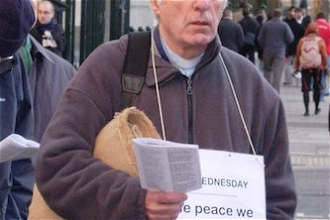South Africa: Church claims lead in fight against AIDS
In the wake of a hostile ad campaign, the Southern African Catholic Bishops' Conference issued the following statement this morning: Advertisements currently appearing in Cape Town and Johannesburg question if the Catholic Bishops care about AIDS sufferers and ask whether they are doing anything to stop the spread of AIDS in Southern Africa. In fact, the Catholic Bishops' Aids office has emerged in the past two years as the SINGLE LARGEST provider - other than the government - of Aids prevention and care programmes through Southern Africa. Between June 2000 and November 2001, the Catholic Bishops' Aids office provided a total of R14 430 818 to fund 116 Aids projects. These projects cover all aspects of the Aids pandemic: 10 orphan care projects, 31 prevention programmes and 75 care and support programmes for Aids sufferers. These programmes reach into the remotest and most marginalised communities in Southern Africa. Even the National Department of Health acknowledges that Catholic service providers, working through the national network of Catholic parishes, are able to get closer to the grass roots than the government's own Aids prevention and caring network. The Catholic Bishops' Conference spokesperson, Bishop Reginald Cawcutt of Cape Town said: "The Church disapproves of trying to combat the spread of Aids by the wholesale doling out of condoms to teenagers. This is as likely to promote promiscuity as anything else. It shows seriously muddled thinking. The Church strongly supports and promotes - as it has for 2000 years - value based education and prevention programmes. They are the only things that ultimately work." There are now projects funded by the bishops in every Catholic diocese in Southern Africa. Some are regarded as pioneering and are internationally recognised leaders in their fields, for example St Francis (Boksburg) in the hospice care field, Sinosizo (Durban) in the area of home based care and Nazareth House (Cape Town) in the area of orphan care. The home based care project of Caring Network, also in Cape Town, has been accepted by the Bishops' Conference as the "best practice" and the model to be used in Southern Africa. In many dioceses bishops are taking the lead in dealing hands-on with the Aids problem. Bishop Slattery of Kokstad has started an Aids Committee, which provides training in every parish in his area for home caregivers. Archbishop Tlhagale of Bloemfontein has drawn on the many retired Catholic nurses in his area to set-up and fund an extensive training and support programme for home-care givers. Strongly supported by grants from the Catholic Bishops' Aids office, many congregations of religious sisters - involved in the health field for decades - are now applying their considerable expertise and experience to deal with the Aids epidemic. Sister Cathy Thomas, for example, is a nurse and was matron of the Catholic hospital in Aliwal North. After leaving Aliwal North, she started the Good Shepherd Hospice in Middelburg. The programme has expanded to such an extent that it now provides all the remote Northern Karoo towns with hospice and home-based care. From the Missionaries of Charity (founded by the late Mother Teresa of Calcutta) who staff the only hospice in the highly urbanised community of Hillbrow in Johannesburg to the reed huts and corrugated iron shacks in Keimoes / Upington on the edge of the Kalahari where Aids care is provided by Isadora Koetzee and her friends from the Catholic church in Paballello, the projects funded and supported by the bishops are making a difference in the every day lives of Aids sufferers. So, are the Catholic Bishops doing nothing about Aids? Quite the contrary. Their response has been compassionate and creative involving all sectors of their church in every geographical area of South Africa, Lesotho, Swaziland, Namibia and Botswana - and in every type of community and physical setting. To see what the Catholic Church and its bishops are doing about Aids and its suffering one needs to look beyond celebrity rhetoric and political correctness. One needs to look at the squatter settlements, the places where unemployed and starving people feed off rubbish dumps, where desperate and destitute people waste away in cardboard shacks. That is where one finds the Catholic church responding to Aids - in the most marginalised and impoverished communities where conditions are so bad that nobody else is prepared to assist. And then one realises that the Catholic Church, under the strong leadership of its bishops, is doing more than almost any other institution in response to Aids. But it is being done, as maybe it should be done, quietly and without fanfare.


















